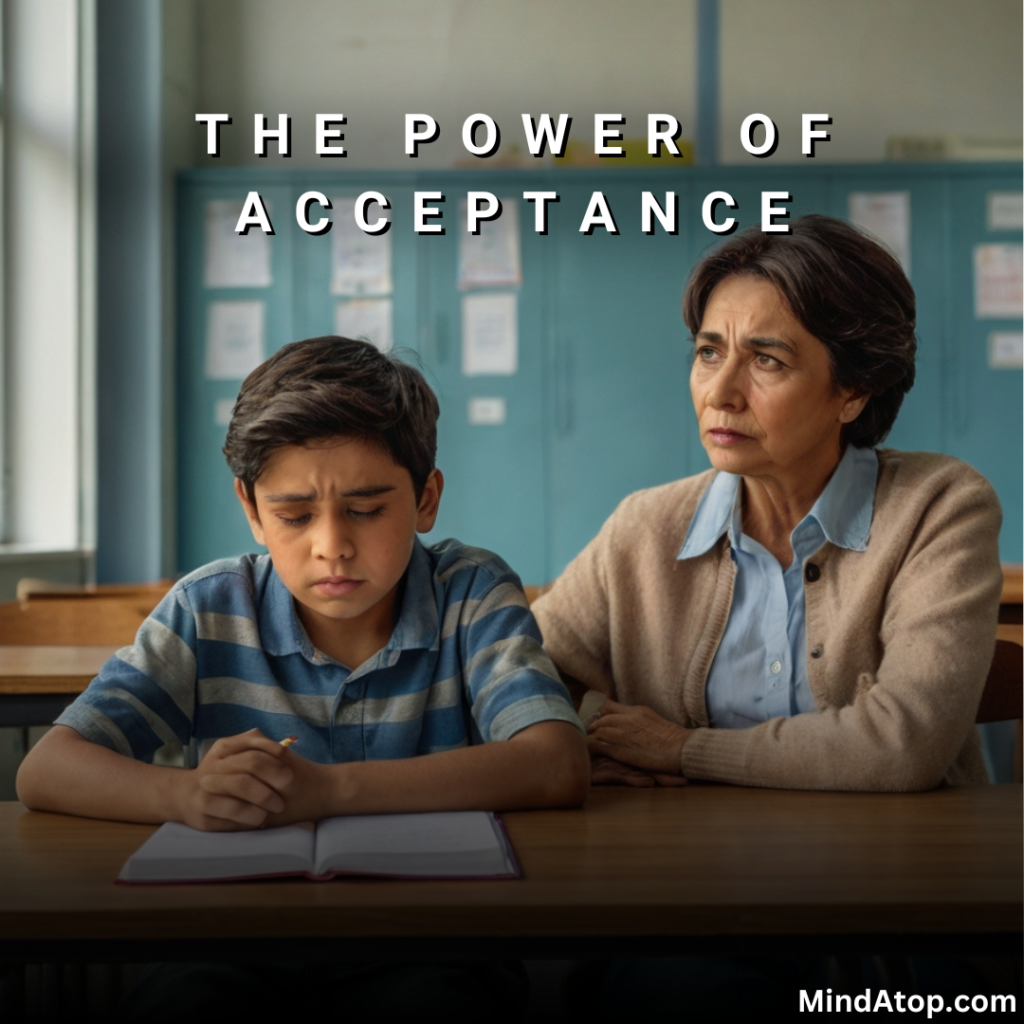The Power of Acceptance
A Teacher’s Faith Transforms a Child — The Power of Acceptance
In a small town, there lived a young boy named Anish. Known for his mischief and curiosity, he often clashed with his strict parents. Their household revolved around discipline and rules, leaving little space for empathy or emotional understanding. But no one yet understood the deeper need for the power of acceptance.
Anish’s parents believed that rigid structure was the key to raising a successful child. They scolded him for every misstep and punished him harshly for the smallest mistakes. Though their intentions were rooted in care, their methods lacked warmth. Instead of becoming obedient, Anish grew more rebellious. He began to feel unseen, unloved, and constantly judged.
As time passed, his frustration turned into anger. He became withdrawn, resented his parents, and started struggling at school. His grades slipped, and his behavior worsened. His teachers labelled him difficult, and his classmates avoided him. Eventually, overwhelmed and desperate, his parents decided to send him to a boarding school, hoping a stricter environment might bring change.
At the new school, Anish’s defiance persisted. He argued with teachers and isolated himself from other students. The rigid school system only deepened his belief that he would never be accepted for who he was. He carried a storm inside him, waiting for someone to notice.
That’s when he met Mrs. Mahindru—a compassionate teacher who believed in more than just rules and results. She saw through Anish’s angry outbursts and recognized a boy who was hurting, not broken. She believed in the power of acceptance and made it her mission to connect with him.
Instead of punishment, she offered understanding. She listened, gently asked questions, and gave Anish space to express himself. It wasn’t easy. Anish resisted at first, but Mrs. Mahindru’s consistent kindness began to chip away at his defenses.
She discovered that Anish wasn’t a bad kid—he was simply craving acknowledgment. He wanted someone to believe in him. Slowly, she helped him focus his energy into productive activities. She encouraged him to read, explore his interests, and speak openly without fear of ridicule.
As Anish felt more accepted, his behavior changed. He started participating in class, helping others, and even smiling more often. His grades improved, and so did his relationships with peers. Mrs. Mahindru had unlocked something powerful in him—the understanding that he was worthy, just as he was.
His parents were called in for a school meeting. They were stunned to see the change in their son. When Mrs. Mahindru explained her approach, they were moved to tears. She reminded them that discipline without love leads to rebellion. It was not strictness, but the power of acceptance that had transformed Anish.
“We tried so hard to correct him,” his mother whispered. “But we never truly saw him.”
Mrs. Mahindru gently responded, “Children don’t need to be perfect. They need to be seen, heard, and accepted. The power of acceptance creates space for growth.”
From that moment on, Anish’s parents changed their approach. They began to speak with more kindness, listened without judgment, and appreciated Anish’s efforts, even when he faltered. They learned that unconditional love doesn’t mean ignoring mistakes—it means guiding with compassion.
Back at school, Anish continued to flourish. He found joy in learning, made close friends, and developed a deep respect for his teacher. His life, once filled with anger and resistance, was now shaped by understanding and connection.
In time, Anish’s story inspired others in the school and community. His journey became a living example of the power of acceptance. It reminded everyone that true change doesn’t come from control—it comes from love, empathy, and the belief that every person, no matter how troubled, has the potential to grow when met with acceptance.
Must Read Stories:
The Master Key – “Acceptance unlocks connection like nothing else.”
I See Your Needs! – “Power lies in being seen, truly.”
Mind Your Attitude! – “Revisit the role attitude plays in softening love.”

